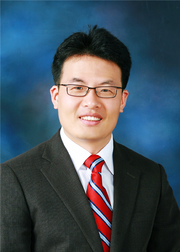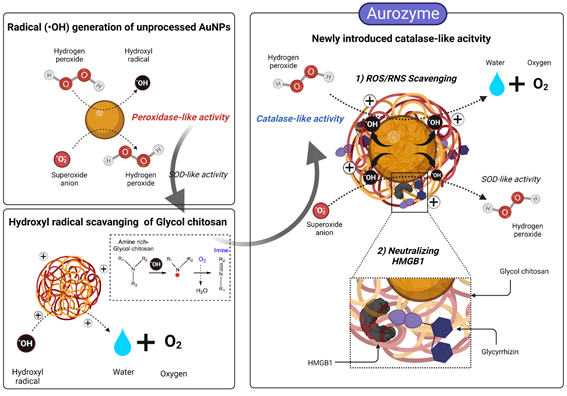Hanyang University
College of Engineering
 NewsFaculty
NewsFaculty
Faculty
| HYU Develops Antioxidant Platform to Remove Rective Oxygen Species for Inflammatory Bowel Disease | |
|---|---|
|
작성자 : 한양대학교 공과대학(help@hanyang.ac.kr) 작성일 : 23.07.27 조회수 : 107 URL : |
|
|
Prof. Lee Dong-yun
Hanyang University announced on June 1 that a team led by Professor Lee Dong-yun of the Department of Bioengineering at Hanyang University has developed a new treatment method for inflammatory bowel disease (IBD). It is expected that multiple hazard signals can be effectively controlled in inflammatory bowel disease by utilizing gold nanoparticle-based nanozyme. Since the amount of antioxidant enzymes in the body is limited, it is limited to treat all the reactive oxygen species that cause inflammatory reactions in our bodies. Gold nanoparticle-based nanozyme (Nanozyme, nanomaterials that act as enzymes in the body) has the property of maximizing the external surface area, which is useful in treating inflammatory damage. However, the disadvantage of existing gold nanozyme is that they can generate other reactive oxygen species due to peroxidase-mimick activity. Aurozyme, a gold nanoparticle-based nanozyme developed by Professor Lee's team, has the ability to remove various types of reactive oxygen species generated in the inflammatory region. Aurozyme can convert reactive oxygen species into beneficial water and oxygen molecules after its surface is coated with a polymer compound and adsorbed to the intestinal mucosa. Accordingly, it shows a 100-fold improved inflammatory control effect. In an experiment targeting mice that induced acute intestinal inflammation, Professor Lee's team confirmed that inhibiting reactive oxygen species in damaged intestines and reducing the mobilization of inflammatory cells, it effectively promotes the regeneration of intestinal tissue, thereby restoring the balance of gut microbiota. This study is expected to be diversified and applied to treatments such as acute inflammatory properties that need to control inflammatory activity such as rheumatoid inflammatory diseases, acute lung damage, and skin diseases. The study, supported by the National Research Foundation of Korea at the Ministry of Science and ICT, was published on May 28, 2023 in “Small (IF=15.153)”, a world-renowned journal in the field of biomaterials and medical engineering.
The paper (Title: Aurozyme: A Revolutionary Nanozyme in Colitis, Switching Peroxidase-like to Catalase-like Activity) was attended by Dr. Kim Hyung-shik and Master’s student Lee Si-eun of Hanyang University's Department of Bioengineering as the first author, and Professor Lee Dong-yun as the corresponding author.
Schematic diagram of Aurozyme illustrating the role of glycol chitosan in converting detrimental peroxidase-like activity to beneficial catalase-like activity, and multiscavenging nanozyme against ROS/RNS and HMGB1. |
|
| 이전글 | HYU's Department of Automotive Engineering Established a Joint Research Lab on Electrification Systems with Hyundai Motor · Kia |
| 다음글 | Prof. Chang Joon-hyuk's Team Got Nine Papers Accepted from INTERSPEECH, a Best Renowned Conference in Voice AI |
|
|


